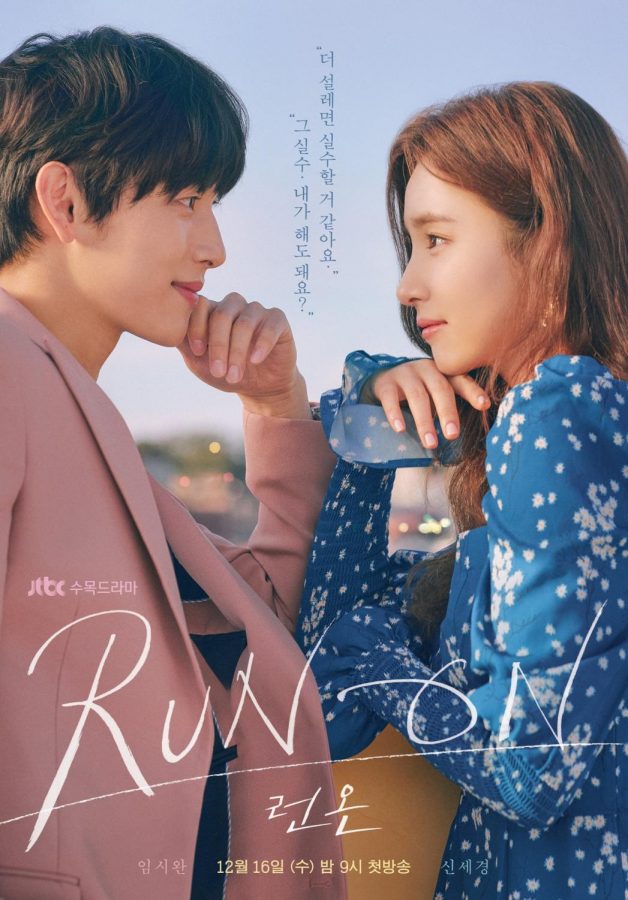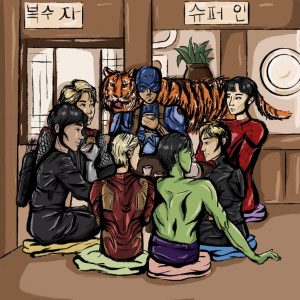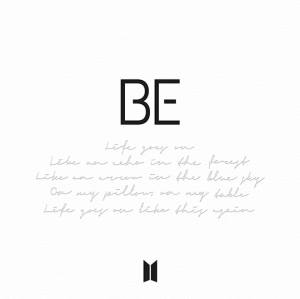“Run on” blends funky characters with a stereotypical love story
JTBC
“Run-on” follows the unconventional dynamics of the growing relationship between Ki Seon-gyeom (Im Si-wan) and Oh Mi-joo (Shin Se-kyung).
April 21, 2021
“A nutjob, a loser, a psychopath, and a piece of trash.” This is how the four main characters of romance K-drama “Run on” are introduced.
We first meet the “nutjob,” Ki Seon-gyeom (Im Si-wan). As a national track and field athlete on the verge of retirement, Seon-gyeom is often overshadowed by the big names in his family. Namely, his mother, Yook Ji-woo (Cha Hwa-yeon), is a famous actress and his father, Ki Jeong-do (Park Young-gyu) is an assemblyman. It doesn’t help that his older sister, Ki Eun-bi (Ryu Abel), is a much more successful athlete than he is. Having to deal with a disjointed family and constant jealousy from those around him, Seon-gyeom has grown into a mentally strong yet almost naive character.
In contrast, Oh Mi-joo (Shin Se-kyung), dubbed the “loser,” is a film translator who also freelances as a part-time interpreter. Both a gun fanatic and a fan of Yook Ji-woo’s, Mi-joo’s lack of connections and bold personality leave her struggling to advance her career in the movie industry. After a disastrous confrontation with her former professor, Mi-joo takes on a job working as an interpreter for Seon-gyeom as an apology.
When visiting the sports center to meet her client, Mi-joo meets the “psychopath,” Seo Dan-ah (Sooyoung). Dan-ah is a rich heiress who opened a sports agency for the sake of styling her favorite athletes. She also happens to be Seon-gyeom’s agent, since he came in a package deal with his sister. Although Dan-ah doesn’t necessarily come off as arrogant, her lack of empathy makes it hard for others to understand her. Her outrageous actions, such as leaving a broken pot on display in order to spite her half-brother who broke it, are used in lighthearted situations to create a sense of comedy in the show.
Lee Young-hwa (Kang Tae-oh) is the drama’s interpretation of the starving artist. A student who wants to pursue oil painting, his first interactions with the other characters is as a passer-by. He is the so-called “piece of trash” introduced in the first episode. Dan-ah takes a fancy to his paintings after seeing them at a cafe, and he is tasked with producing a painting for her family’s art gallery. Young-hwa is instantly enamoured with Dan-ah and seeks to pursue her despite their 6 year age difference.
As their relationships develop, we see them confront their respective problems and situations. The blatant disregard of the bullying occuring in the track team and Assemblyman Ki Jeong-do’s manipulation of his family for his presidential campaign plagues Seon-gyeom, while Mi-joo feels inferior in their relationship with her orphan status. Dan-ah faces her illness and battles over the family business, and Young-hwa struggles with balancing school and his art.
The show chooses to focus not only on the romantic relationships between the two main couples, but it also explores the bonds they have formed with friends and family. Each character is lost and lonely in some way, but the warmth they find hidden in their lives teaches them to push forward no matter what. We watch as the characters learn to live and love truly for themselves. Their emotional growth takes different forms, but despite not being perfect, each of them strives to be better in some aspect of their lives.
Contrary to what one might expect from the typical romance drama, the show’s pacing is funky and the characters are off beat. None of them act the way you’d expect in a poor girl meets rich boy Cinderella-style K-drama. Their unconventional actions (including carrying around a realistic fake gun) and straight faces, as if the viewers are the strange ones for doubting them, bring a unique sense of humor to the show. The characters may seem weird for those who are used to watching more typical K-dramas, but their quirkiness makes the drama strangely charming.
“Run on” breaks stereotypes by reshaping what viewers expect to see in K-drama characters. Despite being plagued with many of the typical tropes found in a romance drama, the drama immediately breaks our impression of how those tropes and plot points should pan out. Although you may not immediately understand the humor, “Run on” is an unorthodox K-drama ready to lift your mood.





